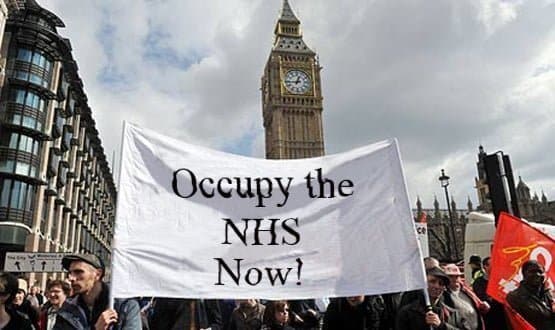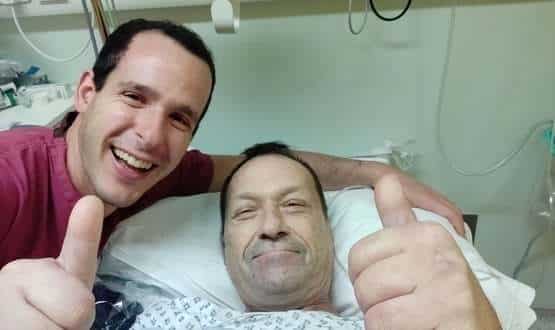Power to the people
- 14 November 2013

Suppose, just for a moment, something just tips us over the edge. I don’t know… perhaps another ten hospitals admit to fiddling cancer waiting times.
Or three junior doctors are videoed on a mobile phone laughing about a death, and it goes viral on YouTube. Whatever.
Something deep in the national psyche cracks and you wake up to find that Occupy the NHS Now! has been born.
There are tents on the lawn outside a trust headquarters, people are door-stopping consultants as they get out of their cars, the media is camped outside the hospital gates.
By lunchtime, another four trusts are affected and by the next morning 16 are occupied.
Occupy the NHS Now! leads the evening news and on the following morning’s Today programme a spokesperson points out that that the movement is just doing what NHS England asked civil society to do – hold it to account.
On Twitter #NHSOccupy is trending and more than half a million people visit the movement’s website to find out ‘how to occupy your hospital’ in its first 48 hours.
(The site’s hints include: never disrupt clinical care; never frighten patients; get staff on your side – they are as stressed as you; look after yourself – use the hospital toilets and canteen since, after all, it’s your NHS, keep warm, go home when you’re tired because there will always be others to take your place; courteously hold management to account; and tweet what they say using #NHSOccupy)
On the way to work, you pass an Occupy camp and some people come out an ask you to support them. Would you join them?
What do you do when you see a colleague who was made redundant in the reforms holding a banner? If you’re the chief executive of an ‘occupied’ trust, do you go out to talk to them?
Power is shifting
Of course, none of this has happened. But I recently began running workshops for senior staff to explore how to deal with this kind of scenario, and on the role of social media in health policy.
Here is what I have learned so far. Firstly, just the words Occupy the NHS Now! produce a soft exhaling, an “ah yes, of course that could happen.” It’s almost as if, after Occupy Wall Street, people have been expecting such a thing.
Secondly, as the simulation unfolds people cling to the idea that they control the agenda. They think that because it makes sense to them to close a maternity unit it must make sense to everyone else.
Finally, participants have little idea of how to use social media or of what it is going to be like to be interviewed while being live streamed onto YouTube. Out of 27 young leaders of the NHS in one workshop, only three had Twitter accounts – and none had tweeted within the last week.
None of this is surprising and we should not blame the participants. Handling this kind of protest is genuinely difficult because the nature of power itself is changing (as outlined in two books, ‘The End of Power’ by Moses Naim and ‘Networks of Outrage and Hope’ by Manuel Castells).
In the past, power tended to become over concentrated in the hands of a few tyrants, kings and tycoons, so we spent 300 years inventing checks and balances on concentrated power: one person, one vote; the rule of law; a free press and an independent judiciary.
But now, things are heading to the other extreme. Power is becoming diffuse: the suicide bomber is as powerful as the tank; and Twitter is much more feared than a press release. Lumbering bureaucracies are brought low by the slings and arrows of outraged citizens.
Your staff are your best response to the future
The slide to diffuse, anarchic power is so new that we are still looking for effective ways to deal with it. What comes out in the workshops is that it is the NHS’s own staff that are key to handling something like Occupy the NHS Now!
It is staff who feel the pull of their own institution and it is staff who know just how far their original motivations to care have been realised or deformed by the present-day NHS. It will be front line staff and the conversations they have with protestors that will likely prove the most productive aspect of any Occupy the NHS Now! movement.
In a sense, both sides love the NHS and it is possible to see that out of this ferment some new sense of common purpose could arise. At the very least, a movement like Occupy the NHS Now! could lead to a deeper debate about the sort of health service we want.
Playing out the Occupy the NHS Now! simulation also helps people see that social media holds the key to retaining trust of both citizens and staff in difficult times.
This is because social media is all about building relationships, about building up credit with your community for a rainy day. For example here is Samantha Jones, chief executive of West Hertfordshire Hospitals NHS Trust, tweeting in ways that create trust from an event that might have destroyed it
07/11/2013 15:26
Very difficult & upsetting mtg with a family we have let down since 2009.I am ashamed of what I have heard-we will make sure we will learn @SamanthaJNHS
To see other NHS leaders who tweet as honestly just follow Rob Webster (@RobWebster_LCH), Lisa Rodrigues (@LisaSaysThis), Mark Newbold (@drmarknewbold) or Jason Leitch (@jasonleitch). Likewise, the wonderful #WeNurses connects a rapidly growing number of nurses to what motivated them to enter the profession in the first place.
Breaking the mutually abusive embrace
But travelling around the NHS I know just how tired, how poor, the huddled masses of NHS staff feel. At Patient Opinion we get many great stories (bit.ly/19WR6Jj ) but also harrowing ones (bit.ly/17leYSA).
At times, staff and the institution of the NHS seem locked in a mutually abusive embrace. From the best and the worst of motives we – all of us who work in the NHS or serve it – sometimes seem incapable of acting without adding to its pain.
And too often, the NHS treats its staff to risk averse, bullying or insensitive management. Meanwhile trust in the NHS is eroding rapidly leaving patients and staff with a growing sense of helplessness that could easily morph into something like Occupy the NHS Now!
Dealing with such a widespread, disparate, motivated, conflicted situation will not be easy. But perhaps, just, social media in all its forms holds one of the keys to growing more trust and a better NHS.
If you would like to know more about how to use social media and the Occupy the NHS Now! simulation then please contact me at paul.hodgkin@patientopinion.org.uk or via @paulhodgkin




